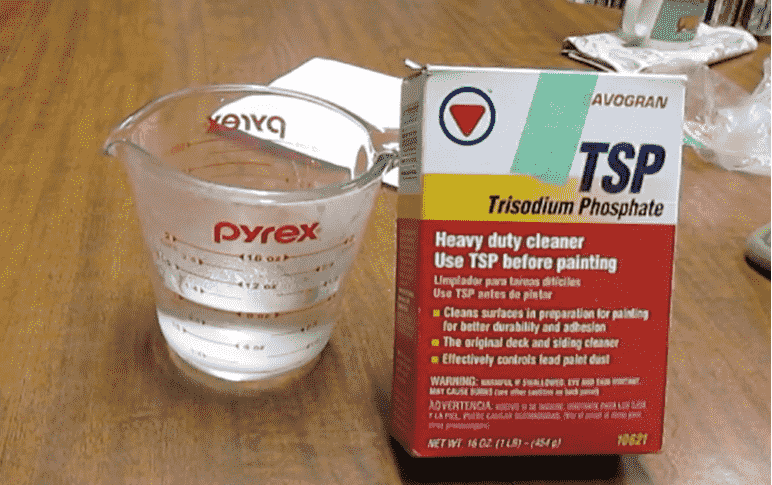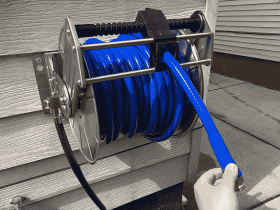Finding the right cleaner for your home can be a daunting task. With so many cleaners in the marketplace, how do you know which one to get?
You do not want to spend a fortune on cleaning products, so you want to find a multi-tasking product that is effective and safe for you, your family, and the environment.
As you walk through the aisles or search online, you come across TSP cleaner. But what is TSP cleaner?
Here are some important things you should know about TSP before using it, including what it is, whether it’s toxic, the risk factors associated with it, what surfaces you can and cannot use it on, and where to purchase it.
What is TSP Cleaner?
TSP stands for Trisodium phosphate. TSP cleaner is a white, odorless, dry powdered heavy-duty cleaner that is effective at cleaning and removing grease, smoke, tough stains, and grime from walls, woodwork, and flooring. The TSP cleaner typically consists of a mix of about 75-80% trisodium phosphate and 20-25% sodium carbonate.
To prepare the cleaning solution, TSP should be mixed thoroughly into hot water. While it is most often used to prepare painted surfaces for repainting, when mixed with small amounts of bleach, it can efficiently remove mildew and mold from a variety of surfaces.
This inorganic compound also has a wide variety of uses. Aside from being an effective cleaning agent, it is also used as a food additive and antimicrobial agent.
Furthermore, TSP can be found as an ingredient in household cleaners, such as dish and laundry detergents, in health and beauty products, such as mouthwashes, toothpaste, shampoos, and conditioners, in medications, and in automotive fluids and additives.
Additionally, TSP, in combination with sodium chloride has been used as a dip to decrease microbial populations on chicken breasts and extend their shelf-life.
Is TSP Cleaner Toxic?
TSP is highly soluble in water and has an alkaline pH between 12-14 in solution.
While it is considered non-toxic to humans and animals, it can cause irritation if exposed to eyes, skin, and airways, and care should be taken when mixing and handling it.
Care should be also taken with pets. Do not allow animals’ foot pads to come into contact with TSP-soaked paper, fabric, or puddles, per the product’s warnings.
Be sure not to mix or store near any acids. Furthermore, store granulated material in a well-ventilated area and keep tightly closed to keep it from caking since TSP can rapidly absorb moisture from the air.
Environmental Implications
Phosphorus is an essential nutrient for all life on this planet.
Since the most common form of phosphorus in living organisms is phosphate, the fact that it is found as an ingredient in many commercial fertilizers and household cleaning products, such as laundry and dishwasher detergents poses an environmental problem for aquatic environments.
The potential run-off from urban areas into lakes, streams, and rivers can cause an increase in algae and aquatic plants. As algae blooms grow, the dissolved oxygen decreases, harming life in the aquatic ecosystem.
Additionally, algae blooms can release toxins that can be harmful to humans and animals. Thus, the use of TSP has direct environmental implications and an indirect effect on human and animal health.
For this reason, as of 2010, seventeen U.S. states have banned the sale of phosphates in automatic dishwasher detergents.
Risk Factors Associated with Using TSP
TSP can cause skin irritation, serious eye irritation, and respiratory tract irritation. The fatal ingestion dose is approximately 50 grams of TSP.
Therefore, if ingested, it is important to rinse your mouth but DO NOT attempt to induce vomiting, as that may cause additional damage. Instead, drink 1-2 glasses of water.
It is also important to avoid breathing any dust, fumes, gases, mist, vapors, or sprays while handling the product. Using the product outdoors or in a well-ventilated area should help avoid respiratory tract issues.
Care must be taken to wash hands immediately after handling. Also, avoid touching your eyes while using the cleaner.
It is recommended that users wear protective gloves, clothing (long sleeves and pants), and eye and face protection.
If contact with the skin does occur, wash the exposed area with plenty of water for at least 15 minutes.
If dust, fumes, gases, mist, vapors, or sprays are inhaled while using TSP, get some fresh air and stay in an upright position.
Rinse eyes with water gently for several minutes. Be sure to remove contact lenses immediately.
Any contaminated clothing items should be washed before re-using.
Should any issues persist, seek medical help right away.
What Surfaces or Materials Are Suitable for Cleaning with TSP Cleaner?
TSP cleaner is very versatile as it can be used on a variety of surfaces. Some of them include:
- Walls, ceilings, and woodwork, including trim to prepare the surface for painting.
- On surfaces with glossy paint, if the goal is to remove the glossy sheen.
- Outdoor house siding.
- Chimneys with soot.
- Bathrooms or areas with mildew and mold.
- Surfaces with lead paint dust.
- Decks.
- Behind refrigerators
- Beams or joists in the crawlspace
What Surfaces or Materials Should Not Be Cleaned with TSP Cleaner?
Although TSP is known as a multi-use, heavy-duty cleaner, care should be taken not to use it on certain surfaces, such as:
- Aluminum surfaces, especially when hot since the reaction can release hydrogen gas.
- Do not use it on surfaces with glossy paint or ceramics, as TSP will remove the glossy sheen and enamel.
- Beware of using TSP on oak, mahogany, and other woods as it may darken them.
- Do not use it on glass surfaces or mirrors as it will damage them.
- Do not use it on steel or brass as TSP may corrode them.
Additionally, only use TSP as a mild solution on printed floor coverings.
What Can You Use Instead of TSP Cleaner?
Due to the harmful effects of TSP, many manufacturing companies discovered tsp cleaner substitutes that work as same as the TSP. Additionally, you can use Borax and Dawn to clean and cut through surface grease.
Where to Buy TSP?
You can purchase through Amazon, as well as any national (Home Depot and Lowes) or local (Ace Hardware) hardware and home improvement stores.
Final Thoughts
Finding the right multi-purpose cleaner can be a little overwhelming. Trisodium phosphate (TSP) can be a great heavy-duty and general household cleaner.
Once you learn what TSP cleaner is, and what some of the risks and recommendations are, you can make an informed and practical decision based on your needs and that of your family.











Leave a Review